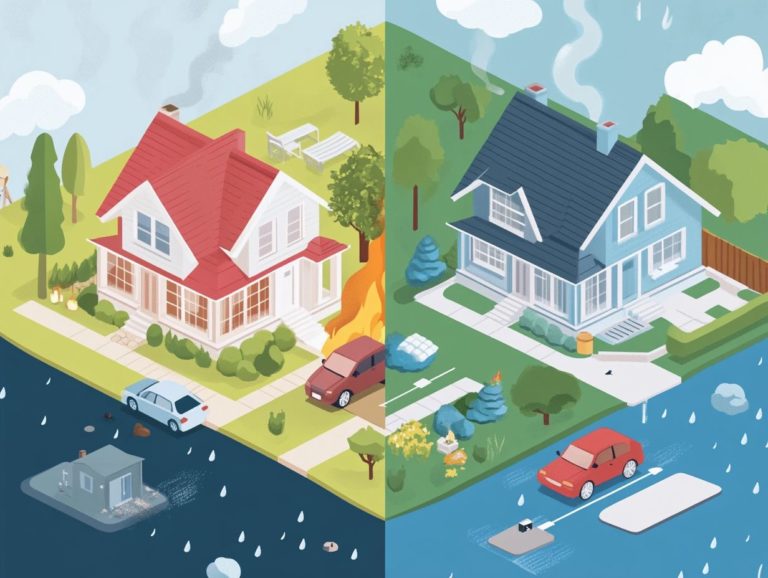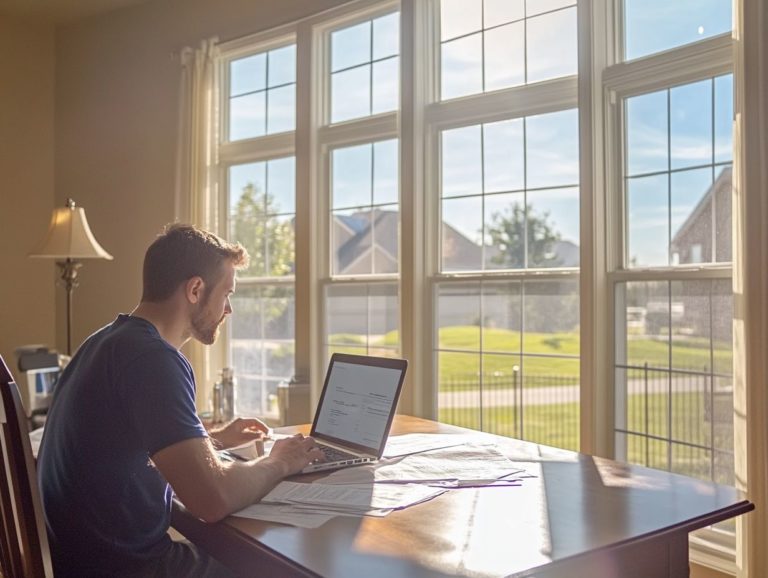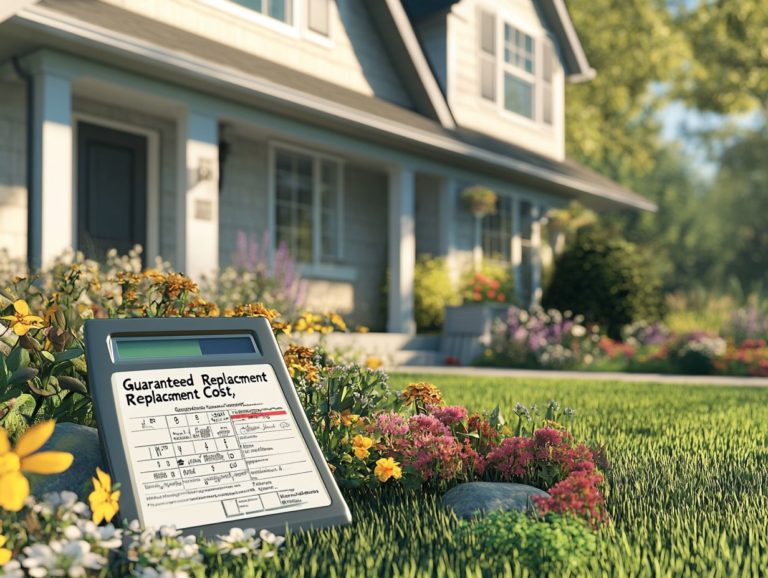What to Know Before Buying Home Insurance
Home insurance serves as an essential safeguard for homeowners, providing peace of mind when the unexpected occurs. Understanding it can seem overwhelming, but familiarizing yourself with coverage options and key factors can significantly enhance your experience.
This article outlines the fundamental aspects of home insurance, identifies common pitfalls, and offers valuable tips for saving money on your policy. You’ll be empowered to make informed decisions for your home.
Contents
- Key Takeaways:
- Understanding Home Insurance
- Factors to Consider Before Purchasing Home Insurance
- Choosing the Right Insurance Provider
- Common Mistakes to Avoid
- Tips for Saving on Home Insurance
- Frequently Asked Questions
- What should I know about home insurance before buying?
- What types of coverage should I consider when buying home insurance?
- How can I determine the value of my possessions for insurance purposes?
- What are some common exclusions or limitations in home insurance policies?
- How can I determine the cost of a home insurance policy?
- How can I ensure I choose a reputable insurance company for my home insurance?
Key Takeaways:
- Identify your coverage needs before buying home insurance for the best fit.
- Research and compare insurance providers for the best coverage and price.
- Avoid common mistakes and save money by utilizing discounts offered by insurers.
Understanding Home Insurance
Understanding home insurance is essential for property owners, especially since your home is likely your largest financial asset. Often referred to as home insurance, this coverage safeguards against risks like natural disasters, theft, and liability claims.
As a policyholder, it’s vital to understand how different types of coverage like dwelling and personal property coverage work together to protect you from unexpected expenses and ensure your financial stability.
What is Home Insurance?
Home insurance serves as a crucial shield for your property, offering financial protection against damages and liability claims. It protects not only the structure of your home but also your belongings from events like fire, theft, or natural disasters. It also provides liability protection if someone is injured on your property, covering legal costs and medical expenses.
Familiarize yourself with your policy specifics, including exclusions that detail what is not covered. Understanding how to file a claim is equally vital, as it helps you navigate the claims process easily in the event of damage or loss.
Types of Coverage
There are several types of coverage within home insurance policies, each designed to protect you from various risks and financial setbacks.
- Dwelling Coverage: This is your primary defense, safeguarding the physical structure of your home and covering repair or rebuilding costs.
- Personal Property Coverage: This protects your belongings like furniture and electronics against theft or destruction.
- Liability Coverage: This protects you from legal claims if someone gets injured on your property.
- Additional Living Expenses Coverage: This covers your living costs if your home becomes unlivable due to damage.
- Cash Value vs. Replacement Cost Coverage: Cash value coverage factors in depreciation, while replacement cost coverage pays for a new item of similar kind and quality, without deducting for wear and tear.
Each type of coverage plays a pivotal role in ensuring comprehensive financial protection.
Factors to Consider Before Purchasing Home Insurance
Before purchasing home insurance, carefully assess your needs and consider what to look for in home insurance coverage that influences the options available to you.
Key elements to understand include coverage limits, the specific risks associated with your property, and any insurance requirements set by your mortgage lender. This knowledge is essential in determining the type of coverage that best suits your situation.
Assessing Your Needs
Assessing your home insurance needs is crucial. This step secures coverage for property damage and personal belongings.
Create a detailed home inventory. List all possessions and their values to ensure nothing is overlooked.
Evaluate risks like natural disasters or crime rates. Understanding these factors helps you customize your insurance for better protection.
Costs and Deductibles
Consider both insurance premiums and deductibles. Knowing how these affect claims is essential.
Insurance companies base premiums on location, property age, and condition. Higher risks usually mean higher premiums.
A claims-free history can lower your costs. Insurers offer discounts for bundling, security systems, and a clean claims record.
Choosing the Right Insurance Provider
Choosing the right insurance provider matters greatly. It affects your service quality and coverage limits.
Researching and Comparing Options
Researching and comparing options is crucial. This helps you find the best coverage for your needs.
Explore various providers to see what they offer. Look beyond price to understand coverage options.
Check policy terms for exclusions that affect your protection. Understanding these details is essential.
Common Mistakes to Avoid
Be aware of common mistakes in home insurance. These can lead to insufficient protection during claims.
Watch for pitfalls that impact your coverage. Overlooking exclusions can lead to unexpected expenses.
Review your policy carefully. Ask your agent for clarification and consider extra coverage to fill gaps.
Tips for Saving on Home Insurance
You can save on home insurance with smart strategies. Thoughtful steps can lower your premiums without losing coverage.
Discounts and Strategies
Start saving big on your insurance premiums by using various discounts and strategies from providers.
For example, many companies offer rewards for installing security systems. These systems lower the risk of theft and damage.
Bundling your home and auto insurance can also lead to significant savings. It s a smart financial move for any household.
Maintaining a claims-free history can earn you loyalty discounts, trimming your costs even more!
By leveraging these strategies, you enhance your peace of mind and improve your finances.
Frequently Asked Questions
What should I know about home insurance before buying?
Know what type of coverage you need and the value of your possessions. Understand the policy cost, any exclusions, and the provider’s reputation.
What types of coverage should I consider when buying home insurance?
Consider property coverage for the home structure and liability coverage for legal claims if someone is injured on your property. Other options include personal property coverage and additional living expenses.
How can I determine the value of my possessions for insurance purposes?
Create an inventory of belongings and take photos or videos of valuable items. Keep receipts or appraisals, and regularly update your inventory for adequate coverage.
What are some common exclusions or limitations in home insurance policies?
Common exclusions may include damages from floods and wear and tear. Review your policy carefully and ask your agent about any limitations.
How can I determine the cost of a home insurance policy?
The cost can vary by location, size, age of your home, and the coverage you choose. Get quotes from different companies to compare coverage and prices.
How can I ensure I choose a reputable insurance company for my home insurance?
Research the company s financial stability and read customer reviews. Look at ratings from agencies like A.M. Best or J.D. Power before deciding.






